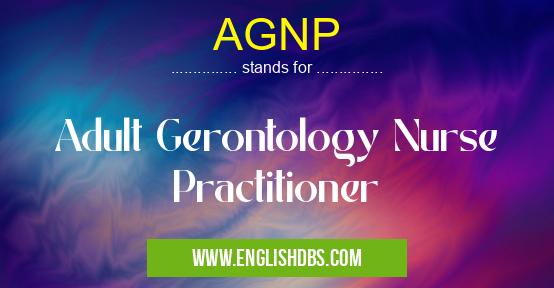What does AGNP mean in NURSING
Adult Gerontology Nurse Practitioners (AGNPs) are advanced practice nurses who specialize in the care of adults and aging individuals. They are trained to diagnose, treat, and manage acute and chronic illnesses in older adults. AGNPs work in a variety of roles to promote health in all stages of adulthood, from young adults through geriatrics. AGNPs provide specialized primary care services such as physical exams, screenings, vaccinations, preventive screenings and counseling.

AGNP meaning in Nursing in Medical
AGNP mostly used in an acronym Nursing in Category Medical that means Adult Gerontology Nurse Practitioner
Shorthand: AGNP,
Full Form: Adult Gerontology Nurse Practitioner
For more information of "Adult Gerontology Nurse Practitioner", see the section below.
The Role Of An Adult Gerontology Nurse Practitioner
The scope of practice for an AGNP includes assessing, diagnosing, prescribing medications, ordering diagnostic tests and developing plans for patient management with a focus on promoting health throughout all stages of life from young adulthood to geriatric age groups. In addition to providing general healthcare services such as physical examinations and preventative screenings, AGNPs may take on additional duties such as coordinating case management services or overseeing home healthcare aides for extended periods of time. AGNPs also educate patients on lifestyle modifications such as diet and exercise which can help improve health outcomes in the long run. Furthermore, they may collaborate with other healthcare providers to coordinate multidisciplinary team approaches for complex medical problems.
Essential Questions and Answers on Adult Gerontology Nurse Practitioner in "MEDICAL»NURSING"
What does 'AGNP' stand for?
AGNP stands for Adult Gerontology Nurse Practitioner.
What is an Adult Gerontology Nurse Practitioner?
An Adult Gerontology Nurse Practitioner (AGNP) is a type of Advanced Practice Registered Nurse, trained to diagnose and treat health issues in adult patients. They help to manage chronic diseases, provide patient education and counseling, run diagnostic tests and referrals to specialists where necessary.
What qualifications do I need to become an AGNP?
To become an AGNP you typically must have a Bachelor of Science in Nursing (BSN), plus at least one year of experience as a registered nurse. You then have to complete an accredited Master's or DPN degree program with adult gerontology emphasis or certification. There are also additional certifications required by most states before you can practice as an AGNP.
Is becoming an AGNP worth it?
Yes! Being an AGNP offers more career opportunities and higher wages compared to other nursing roles. As well as increased autonomy in making clinical decisions, the ability to prescribe medications and the satisfaction of providing comprehensive care for adult patients.
How much does an AGNP earn on average?
According to PayScale, the average salary of a Advanced Practice Registered Nurse (APRN) with Adult Gerontology background ranges from $85,000 - $131,000 annually depending on geographic location and years of experience.
What kind of tasks does an AGNP typically carry out?
Typical responsibilities for ANPs include creating treatment plans, performing physical examinations, taking patient histories, ordering laboratory tests & x-rays, prescribing medications & therapies such as physical therapy as well as diagnosing illnesses & injuries amongst many others.
What does it mean when someone is board certified as an ANP?
Being board certified indicates that a nurse has completed all the training necessary to competently practice as an Adult Gerontology Nurse Practitioner and passed advanced competency exams that evaluate their knowledge and skillset needed in this role. This certification also shows that they are committed to maintaining professional standards through regular continuing education courses.
Does my primary care physician need a referral from me if I want them to refer one of their patients to me for care?
Yes! Usually referral forms are filled out by the primary care doctors office which specify any special information about the patient's condition or treatment plan they would like addressed during your consultation with them. Likewise it’s best practice if you write up your own assessment report summarizing your findings during each visit so that the PCP can access all relevant patient data easily when needed going forward.
Who should be referred to me for medical services?
Patients who would benefit most from being seen by a specialist Adult Gerontology NP would include those suffering from age-related health problems such as osteoporosis, Parkinson's disease or dementia; those needing management of ongoing chronic conditions including diabetes; those requiring help transitioning from hospital care back into their homes; anyone undergoing end-of-life or palliative care services.
Final Words:
Adult Gerontology Nurse Practitioners (AGNPs) are essential members of the healthcare team working to promote healthier lifestyles for adult patients across all ages from young adulthood to late life. They use evidence-based guidelines to provide comprehensive primary care with a focus on disease prevention through screening tests, vaccinations, healthy lifestyle advice, medication management among others depending on individual needs. Working collaboratively with other members of the healthcare team they ensure continuity of care by addressing physical as well as psychosocial issues affecting individual patient’s medical conditions for achieving optimal outcomes over time.
